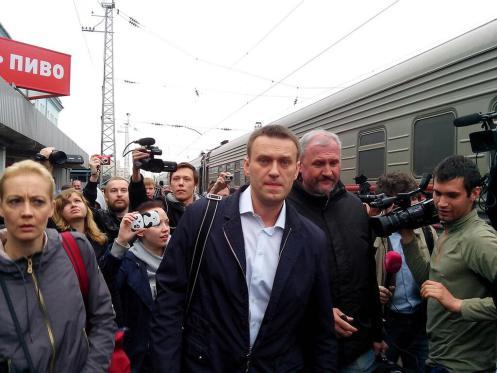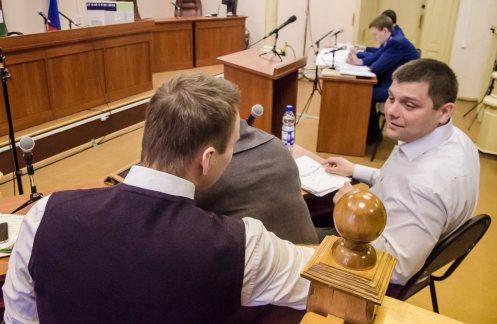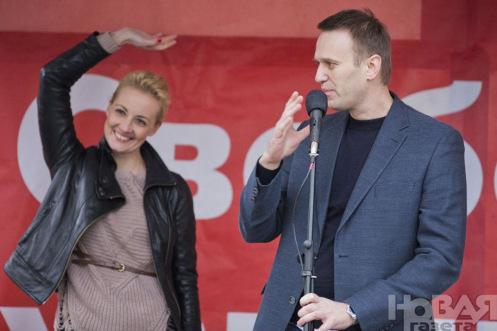It was obvious from the start that the Navalny case was politically motivated and yesterday the Leninsky District court in Kirov sentenced Alexei Navalny to five years in prison for allegedly stealing timber from a company in which Navalny had been a director.
The tip-off that a prison sentence was about to be handed down came the day before yesterday when Moscow Mayor (acting) Sergei Sobyanin certified Navalny’s candidacy for the Moscow mayoral election, indicating that the city had made the certification a priority in order to show fairness to Navalny. Now that he has been convicted and sentenced his candidacy for mayor is no longer valid.

Navalny on his way from Moscow to Kirov for sentencing.
When pressed, prosecutors office spokesman Vladimir Markin denied that the trail was political but admitted that the Navalny case had received priority status because Navalny’s political activities amounted to “teasing” the authorities.
We might point out that the prosecution’s star witness was the former timber manager who had been fired for stealing. It was near comical in that the government charged Navalny with stealing more timber in 2009 than the company had the capacity to produce annually.
Perhaps the biggest signal for this being a bogus trial was that the theft charges took place without an audit. An official audit would certainly shed light on who stole what and how much was stolen. One of Navalny’s defense strategies was to request that a government audit be conducted however prosecutors argued that an audit wasn’t necessary to determine guilt and would be too time consuming. The court ruled in favour of the prosecutor, something almost guaranteed in Russian courts.

Navalny (left) in Kirov courtroom at the defense table.
In addition to denying the request for a state audit, Judge Blinov barred the defense from calling 13 witnesses and did not allow the defense to cross-examine prosecution witnesses. A second co-defendant, Vyacheslav Opalev, opted to testify against Navalny and received a suspended sentence. During the trial Opalev appeared to give contradictory evidence but defense lawyers were not allowed to cross-examine him.
Navalny’s co-defendant Pyotr Ofitserov was sentenced to four years in prison. Ofitserov had been promised a suspended sentence if he testified against Navalny but he refused. Defense attorneys showed the court that Ofitserov lived a simple life in a Moscow suburb with no records of banking transactions that would accompany hundreds of thousands of dollars customary with stealing large amounts of timber but to no avail. Unlike Navalny, Mr. Ofitserov has not been active in political opposition.
Reaction from Russian activists was swift: Former Soviet president Mikhail S. Gorbachev reacted by saying that the Navalny case was further “proof that we do not have independent courts” and that “using the courts against political opponents is unacceptable.”

Navalny with his wife Yulia at a political rally last year.
Mikhail Khodorkovsky, jailed former Yukos Oil CEO labeled the verdict “predictable and inevitable because for Russia there is nothing unusual in the state convicting political opponents on criminal charges — from the times of Stalin’s terror to the days of Khrushchev and Brezhnev.” Khodorkovsky also wrote, “our judicial-legal system has diligently portrayed opponents of the regime as ordinary criminals, allowing the heads of state to hypocritically make statements about the absence of political prisoners.”
One of the most damning to the reactions was from long-time Putin ally and now former Treasury Minister Alexei Kudrin who commented on Twitter that “The verdict seems less like a punishment and more like it is aimed at isolating him from society and from the election process.”
Just released polls show that the continued arrests of opposition rally leaders is having a chilling effect on the Russian public. In a Levada Centre poll released yesterday just 11 percent of those questioned said they would take part in future political rallies.
Popular Moscow Echo radio host Sergei Parkhomenko announced that he was surprised by the verdict because Navalny’s imprisonment would cause Russian citizens to lose faith in the electoral process.
Outspoken crime novelist Boris Akunin, also a political opposition leader, echoed similar sentiments, saying that the conviction meant the end of real elections. “Lifetime deprivation of elections — this is what the verdict means not only for Navalny but for all who thought it was possible to change this system through elections.” Mr. Akunin wrote that “as long as the Putin regime is alive, there will not be elections. The answer to the question ‘to be, or not to be’ that is to boycott or not boycott, has been answered.”
Mendeleyev Journal footnote:
Just as in the Yukos case, expect more charges in the coming months. Five years is not long enough to keep Navalny out of Mr. Putin’s hair so Navalny’s troubles haven’t ended by any stretch. We feel sorry for Mr. Navalny, his wife Yulia, and their two children, Dasha and Zahar. The family status combined with such absurdly bogus charges make this an especially cruel sentence. Navalny is just 37 years old.
